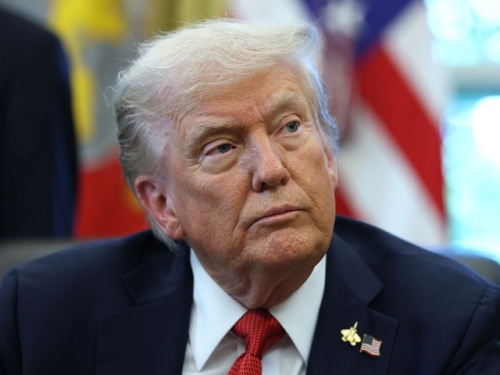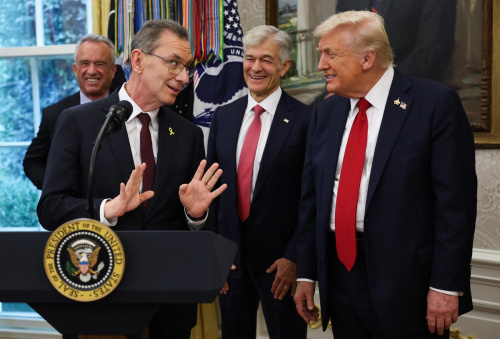.
Trump Announces Deal With AstraZeneca to Lower Drug Prices
The U.K.-based company will offer discount pricing to low-income Americans and make a $50 billion investment in U.S. manufacturing.

Lawrence Wilson
10/10/2025|Updated: 10/11/2025
President Donald Trump announced on Oct. 10 an agreement with AstraZeneca to lower drug prices in the United States.
The U.K.-based pharmaceutical manufacturer will offer most-favored-nation drug pricing on all medications to Medicaid recipients, guaranteeing them the lowest price available in any developed country.
AstraZeneca will also offer many medications at heavily discounted rates through TrumpRx.gov, which is expected to launch early next year.
Trump made the announcement alongside AstraZeneca CEO Pascal Soriot and senior administration officials, including Health Secretary Robert F. Kennedy Jr., and Virginia Gov. Glenn Youngkin.
AstraZeneca will also invest $50 billion in drug manufacturing, research, and development in the United States, including a facility in Charlottesville, Virginia, that is expected to provide 3,600 jobs.
“Presidents have promised for years to lower the cost of health care, but my administration is actually the first to do it and do it substantially,” Trump said.
Trump issued an executive order in May asking drug makers to voluntarily offer the lowest price to U.S. customers. When that proved fruitless, the president in July advised 17 pharmaceutical companies to comply within 60 days or face “additional aggressive action.”
“I have to say I was pessimistic about doing [the most-favored nation policy],” Kennedy said.
“The President saw something that we didn’t see,” Kennedy said, “which is we had ... extraordinary leverage to craft these deals.”
Dr. Mehmet Oz, administrator of the Centers for Medicare and Medicaid Services, said all primary care medications sold by AstraZeneca will be available on TrumpRx. “That means no more gaming, no more middlemen,” Oz said.
Drugs for lung diseases will be heavily discounted, up to 650 percent, Oz said. He predicted 95 percent of drugs sold in America will be available at most-favored nation pricing by 2029.
“It is about lowering the price of medicines for American patients while ensuring that America remains a global powerhouse of innovation in biopharmaceuticals,” Soriot said.
“America has shouldered a disproportionate portion of the world’s R&D,” Soriot added.
“That imbalance is not sustainable. It had to change,” he said.
AstraZeneca already has 19 sites in the United States, employing some 25,000 people, according to Soriot. The company plans new facilities in Massachusetts and Maryland, and an expansion of facilities in Texas, in addition to the Virginia site.
AstraZeneca was granted a three-year tariff exemption to reshore product operations.
Pfizer became the first to respond, announcing from the White House on Sept. 30 that it had agreed to offer select medications to U.S. customers at an average 50 percent discount and to invest $70 billion in U.S. research, development, and capital projects.
Other pharmaceutical companies have independently announced price reductions on some medications for U.S. patients who self-pay.
Amgen announced on Oct. 6 that it would offer Repatha, its injectable medication to treat high cholesterol, through TrumpRx.gov “in support of the Trump Administration’s efforts to lower drug prices for Americans.”
The drug will be available to U.S. patients for $239 per month, a 60 percent discount.
Novo Nordisk announced in August that it would sell its diabetes medication Ozempic at $499 per month, a 50 percent discount, to U.S. patients who are uninsured or choose to self-pay.
French drug maker Sanofi announced in September that it would sell any of its insulin products for $35 per month to U.S. patients regardless of their insurance status.
Indianapolis-based Eli Lilly announced in June that it would sell its popular weight-loss drug Zepbound for the discounted price of $499 to cash-paying customers.
Trump hinted on Sept. 30 that a further announcement would be coming from the Indianapolis-based company. A spokesperson for Eli Lilly declined to comment to The Epoch Times on the matter.
Advocacy group Patients for Affordable Drugs reacted to the spate of recent price announcements, saying they leave patients dependent on the goodwill of corporations.
Mentioning the discounted price offered for Repatha, the group said in an Oct. 10 statement: “These piecemeal discounts underscore the limits of voluntary action: $239 a month remains impossible for many patients … Real affordability will require systemic reforms.”
-------------------
Source: The Epoch Times
Link:
https://www.theepochtimes.com/us/tru...tm_campaign=gp
.
































